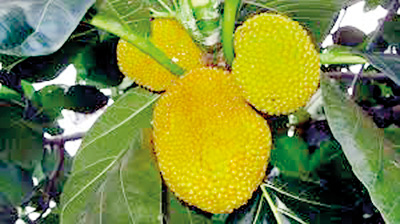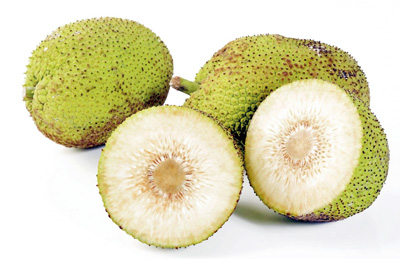Power-packed local favourite
 Did you ever imagine that the humble breadfruit packed with nutrients and with its impressive array of health and medicinal benefits is now being hailed as a wonder food? From a nutritional perspective, breadfruit is high in energy from carbohydrates and low in protein and fat. It is a good source of fibre, and minerals, calcium, copper, iron, magnesium, manganese and phosphorous. Similar to other tropical delicacies, it is rich in many vital B-complex groups of vitamins and is also an average source of thiamin, pyridoxine, riboflavin, niacin and iron. Breadfruit is low in saturated fat, cholesterol and sodium and very high in vitamin C, dietary fibre and potassium.
Did you ever imagine that the humble breadfruit packed with nutrients and with its impressive array of health and medicinal benefits is now being hailed as a wonder food? From a nutritional perspective, breadfruit is high in energy from carbohydrates and low in protein and fat. It is a good source of fibre, and minerals, calcium, copper, iron, magnesium, manganese and phosphorous. Similar to other tropical delicacies, it is rich in many vital B-complex groups of vitamins and is also an average source of thiamin, pyridoxine, riboflavin, niacin and iron. Breadfruit is low in saturated fat, cholesterol and sodium and very high in vitamin C, dietary fibre and potassium.
Today breadfruit is grown in some 90 countries throughout South and Southeast Asia, the Pacific Ocean, the Caribbean, Central America and Africa. In Sri Lanka, the breadfruit tree inside the Galle Fort is believed to be the oldest in the country. Popular belief is that the Dutch introduced breadfruit to Sri Lanka thinking that the highly ‘heaty’ nature of the fruit would either kill them or make them sick. But Sri Lankans ate breadfruit with coconut and coconut neutralized the adverse effects. Ultimately it became a delicacy among the population and there is no part of Sri Lanka where you cannot find a breadfruit tree.
 Breadfruit (Artocarpus altilis) (Del or Dhel in Sinhalese and Eerapelaka in Tamil) is a member of the mulberry family Moraceae. The scientific or Latin name is derived from Greek (artos = bread, karpos = fruit), and altilis means fat. Its name is derived from the texture of the cooked moderately ripe fruit, which has a potato-like flavour, similar to freshly baked bread.
Breadfruit (Artocarpus altilis) (Del or Dhel in Sinhalese and Eerapelaka in Tamil) is a member of the mulberry family Moraceae. The scientific or Latin name is derived from Greek (artos = bread, karpos = fruit), and altilis means fat. Its name is derived from the texture of the cooked moderately ripe fruit, which has a potato-like flavour, similar to freshly baked bread.
Power pack for energy
Breadfruit is roughly 25% carbohydrates which is a good source of energy. About 100g of the fresh fruit provides a significant amount of approximately 100 calories with the major fraction being contributed by the carbohydrates. These carbohydrates are our body’s primary source of energy, so carbohydrate-rich foods such as breadfruit are of much benefit to athletes and other active individuals. Since breadfruit has a good amount of starchy carbs and potassium, it can be a great food post-workout to replenish muscle glycogen stores (energy stores) and to replace lost electrolytes.
Brimming with goodness of fibre
Breadfruit is rich in fibre and has more fibre than jakfruit, which makes it a good bulk laxative. With about 5g of fibre per 100g of breadfruit, it is one of the highest fibre-rich fruits. Dietary fibre helps reduce blood cholesterol by preventing its absorption in the gut, reduces obesity, blood pressure and helps protect the colon mucous membrane by warding off cancer-causing chemicals from the colon.
Fibre also offers numerous health benefits: it helps promote satiety, aids in digestion and regulates effective bowel activity preventing constipation which is nefarious for weight loss. Fibre also keeps cravings, binging and hunger pangs at bay as it is slow-digesting and filling. Since fibre delays the digestion process, metabolism speeds up and a faster metabolism has been proven to burn fat more effectively.
Excellent source of Potassium
Fresh breadfruit is brimming with the heart friendly nutrient potassium (with about 1000mg in a 1 cup serving) that regulates blood pressure and your heart rate. Potassium is vital for health, as it conducts electrical charges in the body that drive muscular contractions in skeletal and smooth muscles, including the heart. The high potassium content of breadfruit is essential for people who exercise regularly. When we exercise, we lose electrolytes in our sweat notably potassium and sodium. These lost electrolytes must be replaced. Potassium can also prevent muscle cramping and is effective for maintaining a healthy cardiovascular system and a proper function of our cells and organs.
Resistance against infections
Breadfruit contains more vitamin C than jakfruit and banana, averaging about 20mg/100g. Vitamin C (ascorbic acid) is a strong water-soluble antioxidant that helps the body to develop resistance against infectious agents. It also scavenges harmful free radicals from the body that lead to aging and other age-related diseases. The Vitamin C content in breadfruit also promotes collagen production that provides elasticity to skin.
Hair-friendly nutrients
Breadfruit contains several hair-friendly nutrients, which are required for maintaining the health of hair. Vitamin C in breadfruit facilitates the absorption of minerals and provides nourishment to the hair. The moderate amounts of iron in breadfruit improve blood circulation in the scalp, stimulating the hair follicles to promote hair growth. The fatty acids present in breadfruit regulate sebum production, reduce dandruff and itchiness. It also inhibits scalp inflammation and cell death, which keeps hair-fall in control.
Omega 3 and 6 fatty acids:
Breadfruit is a rich source of omega-3 and omega-6 fatty acids which are vital for the proper development of the mind and body. These fatty acids also naturally condition the hair, reducing hair breakage. Besides being beneficial for skin and hair, these two essential fatty acids also play a role in regulating metabolism and promoting bone health and maintaining a healthy heart.
Low protein content
Breadfruit is low in protein. Although protein offers health benefits, eating a low-protein diet can be helpful in instances of liver and kidney problems where high protein strains these organs. In these instances breadfruit is a low-protein option for inclusion in the diet.


